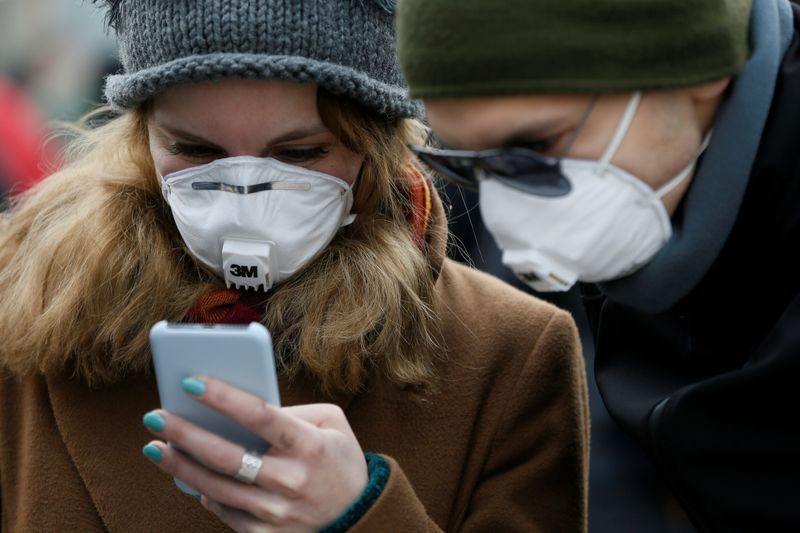By Douglas Busvine and Andreas Rinke
BERLIN (Reuters) - Germany has chosen a home-grown technology for smartphone-based tracing of coronavirus infections, putting it at odds with Apple (NASDAQ:AAPL) which has refused on privacy grounds to support the necessary short-range communication on iPhones.
The government has told lawmakers it has chosen a design developed for the Robert Koch Institute - the agency leading Germany's coronavirus health response - that would hold personal data on a central server.
Countries around the world are rushing to launch digital contact tracing apps to identify who an infected person has had contact with as part of efforts to slow the spread of the pandemic.
In Europe, governments want to use Bluetooth 'handshakes' between devices as a way to measure the risk of infection, but approaches differ as to whether such contacts should be logged on devices or on a central server.
Germany, lawmakers told Reuters, has backed the centralised platform developed by the Pan-European Privacy-Preserving Proximity Tracing (PEPP-PT) consortium and an app built by one of its members, the Fraunhofer Heinrich Hertz Institute.
"This solution requires the central storage of anonymised data, but represents a workable approach in terms of data protection and security," said Tankred Schipanski, digital affairs spokesman of Chancellor Angela Merkel's conservatives.
Apple has, however, refused to allow such apps to monitor Bluetooth while running in the background. Apple and Alphabet (NASDAQ:GOOGL)'s Google have proposed tweaks that would best support device-based, decentralised apps.
"The chancellery is in talks with Apple but so far no solution is in sight," opposition lawmaker Anke Domscheit-Berg said after parliament's digital affairs committee was briefed by a government representative on Wednesday.
EUROPEAN SCHISM
Ideally, such national contact tracing apps would be interoperable, enabling them to 'talk' to each other across borders and making it possible to lift restrictions on travel that have crushed economic activity.
But Europe has split into two camps with Germany, France, Italy and Britain backing centralised solutions.
France has clashed with Apple over Bluetooth tracking while Thierry Breton, the European Union's industry chief, has told Apple CEO Tim Cook that apps being developed by governments should work on its devices.
Leaders of the expert community have, meanwhile, come out strongly against a centralised approach, with 300 scientists signing an open letter this week that said it "would allow unprecedented surveillance of society at large".

An alternative, decentralised protocol developed called Decentralised Privacy-Preserving Proximity Tracing (DP-3T https://github.com/DP-3T/documents/blob/master/DP3T%20White%20Paper.pdf) will be used for a Swiss app and may be adopted by Austria, whose Stopp Corona app has been downloaded 400,000 times.